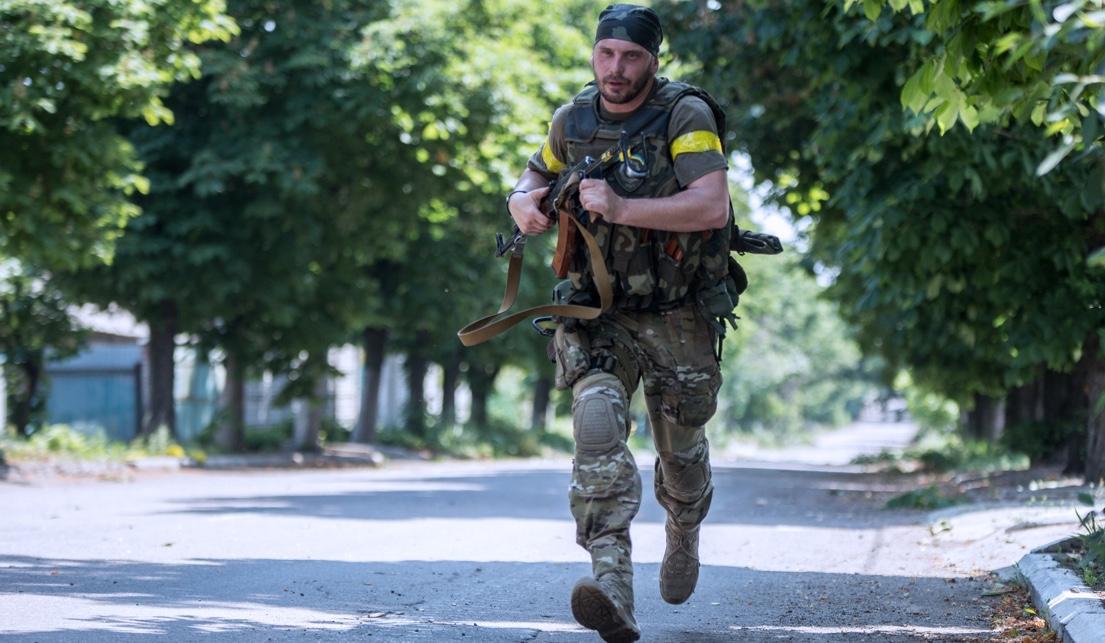The fighting in eastern Ukraine is getting worse again
A Ukrainian serviceman runs during fighting in the Donetsk region of eastern Ukraine on June 4, 2015.
Editor's note: This is Chatter, our morning rundown of what you need and want to know around the world. Fortunately for us all, you can have Chatter emailed to you every day. Just sign up here!
NEED TO KNOW:
The fighting in Ukraine, which never really stopped despite a ceasefire signed in February, has in recent weeks intensified significantly. On Wednesday, clashes involving tanks erupted around Donetsk, the eastern Ukrainian city that was taken by pro-Russian separatists in January.
Ukraine President Petro Poroshenko told lawmakers that there was a “colossal threat” that large-scale fighting was returning to eastern Ukraine. He even warned that a “full-scale invasion” from Russia was a real possibility.
Russia has always denied backing the Ukrainian separatists. But almost no one outside of Russia believes that. A Reuters journalist last week witnessed Russia's army mobilizing at a makeshift base near the Ukraine border. Also last week, the Atlantic Council — a research group based in Washington — released a report detailing Russian activity in Ukraine. The report is called, "Hiding in Plain Sight."
Separatists now control much of the southeastern border region. And many think Russia wants to press south to link Russia with the southern peninsula called Crimea, a vacationland that Russia took from Ukraine days after Ukrainians toppled their corrupt, pro-Russian leader in February 2014.
The increased fighting and military posturing from Russia has led to increased calls in the West to give Ukraine military support. Ukraine could also use economic support. The Ukrainian economy is expected to shrink 9 percent this year, the International Monetary Fund said earlier this week. The conflict, meanwhile, has so far killed more than 6,400 people.
WANT TO KNOW:
“If all goes according to plan,” writes GlobalPost Senior Correspondent Patrick Winn, “a little Thai girl nicknamed Einz, who is now dead, will some day read this sentence.”
Einz's parents made the incredible decision to have their daughter cryonically preserved when she was nearly 3 years old and modern medicine could no longer fight the aggressive strain of cancer that had infected her brain. Doctors filled her brain with medical-grade antifreeze and shipped Einz off to a vault in Arizona. She is the youngest person in the world — and one of very few Asians — to undergo the procedure.
Winn sat down with Einz's parents, who are both accomplished electronic engineers, for a wide-ranging, in-depth interview. What they have to say — about the future, the criticism they have received, what they believe is a soul, influence from science fiction — is all amazing.
These are loving parents who believe that in the next few decades science will lead to a series of incredible advancements in technology — including in artificial intelligence — like the world has never seen. This is not a new idea. It's an idea a lot of smart people around the world believe to be true. They call it the Singularity.
The parents admit that it is pretty unlikely that they will see Einz alive again in their lifetime. They are both planning to be cryonically preserved themselves. But the likelihood of all three being successful reanimated and then reunited is also slim. Since they probably won't be around, the parents are putting together files so that Einz will understand her origins.
“We’ll be including a PDF of this article in her files,” they said. You can read the full interview here.
STRANGE BUT TRUE:
South Africa has been deeply hurt by the US-led investigation into FIFA, which governs world soccer and decides where the World Cup should be played. The investigations have led to numerous arrests and the resignation of FIFA's longtime president, Sepp Blatter.
The investigation also revealed evidence that South Africa paid a large bribe in order to hold the World Cup in 2010. It was a devastating revelation for many South Africans. One journalist said FIFA and the leaders it worked with had stolen South Africa's self respect.
South Africa's sport minister, however — unsurprisingly — had a slightly different take on matters. He defended the former FIFA president, calling him a “good friend” of South Africa. And the rhetoric didn't stop there.
"We will not allow us to be collateral damage in the battles that are ensuing in the geopolitical space," the minister said.
“If these developments will leave us as the way we have left the people of Iraq and Afghanistan, then it was not a worthy cause to pursue. But if they are about bringing justice and cleanliness in football, then let’s all sing hallelujah.”
Ok then.
We want to hear your feedback so we can keep improving our website, theworld.org. Please fill out this quick survey and let us know your thoughts (your answers will be anonymous). Thanks for your time!
